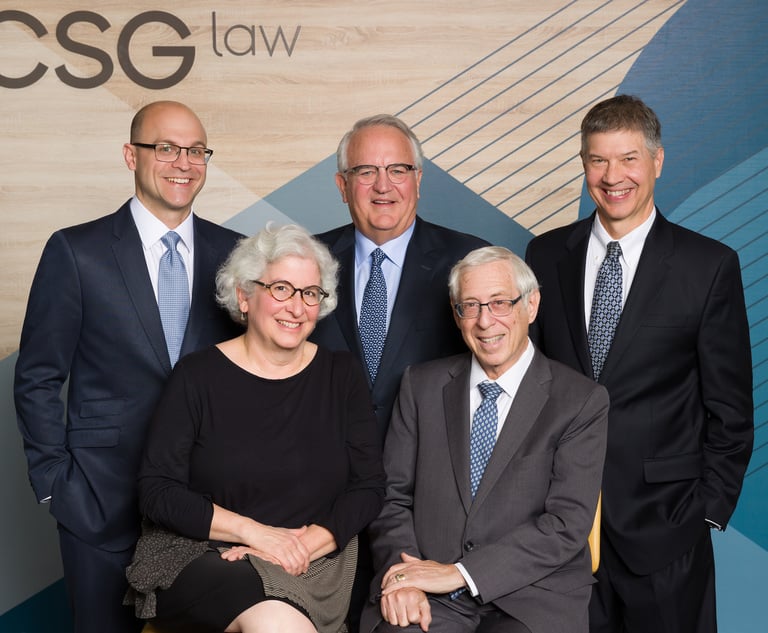High Court to Weigh in on Weekend Jail For Driving on Suspended License
The New Jersey Supreme Court has agreed to decide if those convicted of driving on a suspended license may serve their mandatory 180-day jail terms through intermittent incarceration.
August 21, 2018 at 11:31 AM
4 minute read

The New Jersey Supreme Court has agreed to decide if those convicted of driving on a suspended license may serve their mandatory 180-day jail terms through intermittent incarceration.
Prosecutors are seeking to overturn a published ruling from the Appellate Division that said there is nothing to bar trial judges from allowing those drivers to serve their sentences on an intermittent basis, so long as their jail stays total 24 hours each.
The Supreme Court granted a petition for certification in the case, State v. Rodriguez, earlier this month, on Aug. 1.
The April 2018 decision affirmed lower court rulings allowing five Camden County drivers who had been convicted of the fourth-degree offense of driving while suspended—Rene Rodriguez, Elizabeth Colon, Eric Lowers, Stephen Nolan and Courtney Swiderski—to satisfy their jail sentences in this way.
Appellate Division Judge Mitchel Ostrer. joined by Judges Jack Sabatino and Lisa Rose, said at the time that intermittent sentences, such as Friday night through Sunday, allow those drivers to continue to be employed, assuring continued salary and benefits such as health insurance, and to continue to take care of their families. Such was the case with with most of the drivers involved in the appeal, the court said.
The five cases are not connected; they were consolidated for appeal.
“The Appellate Division made the right decision, and we believe the Supreme Court will ultimately uphold that decision,” said Marissa Costello of Costello & Whitmore in Marlton, who represents Lowers and Nolan. “We don't believe the state's position is going to stand up.”
Mark Oddo represents Swiderski.
“This is a very big question,” said Oddo, of Dubois, Sheehan, Hamilton, Levin & Weissman in Camden.
He said lawyers from other counties appear to be watching to see the outcome. “My sense is that this is a major issue throughout the state. This will have a statewide impact.”
Rodriguez's lawyer, Hainesport solo Mario Persiano, has retired and could not be reached. It does not appear that Colon is currently represented by counsel.
Assistant Camden County Prosecutor Jason Magid is leading the appeal for the state. He did not return a call seeking comment.
The Appellate Division in its ruling last April said: ”The state contends the sentences are illegal. It argues a minimum period of parole ineligibility precludes an intermittent sentence. We disagree.”
Prosecutors argued that the intermittent sentences thwart the Legislature's purpose to hand down punitive sentences, but the statute lacks language requiring that the 180-day sentence be served consecutively, and states only that 180 days must be served, Ostrer said.
“We find no basis for the argument that an indeterminate sentence … violates the parole ineligibility terms,” he said. “Simply put, periodic release under an indeterminate sentence is not parole.”
Ostrer noted that intermittent incarceration spreads the sentence out over a longer period, which itself could serve as a deterrent for further violations—by reminding offenders each time they surrender that they still may have many days and nights to serve before their sentences are complete.
Nevertheless, he said, allowing the indeterminate sentences allows these offenders to keep their jobs and perhaps avoid financial and emotional burdens.
“Had the legislature defined the sentence in terms of months, one could make a stronger argument that the legislature intended the days to be served consecutively,” Oster said. “The legislature did not.”
In a related issue, the Appellate Division last month decided that intermittent jail service was “not an option” for those sentenced to jail on multiple drunken-driving offenses.
This content has been archived. It is available through our partners, LexisNexis® and Bloomberg Law.
To view this content, please continue to their sites.
Not a Lexis Subscriber?
Subscribe Now
Not a Bloomberg Law Subscriber?
Subscribe Now
NOT FOR REPRINT
© 2024 ALM Global, LLC, All Rights Reserved. Request academic re-use from www.copyright.com. All other uses, submit a request to [email protected]. For more information visit Asset & Logo Licensing.
You Might Like
View All
Chiesa Shahinian Bolsters Corporate Practice With 5 From Newark Boutique
5 minute read
On the Move and After Hours: Brach Eichler; Cooper Levenson; Marshall Dennehey; Archer; Sills Cummis
7 minute read
Construction Worker Hit by Falling Concrete Settles Claims for $2.3M
4 minute read
Eagle Pharma Founder Sues Company to Recoup Cost of SEC Investigation
2 minute readTrending Stories
Who Got The Work
Michael G. Bongiorno, Andrew Scott Dulberg and Elizabeth E. Driscoll from Wilmer Cutler Pickering Hale and Dorr have stepped in to represent Symbotic Inc., an A.I.-enabled technology platform that focuses on increasing supply chain efficiency, and other defendants in a pending shareholder derivative lawsuit. The case, filed Oct. 2 in Massachusetts District Court by the Brown Law Firm on behalf of Stephen Austen, accuses certain officers and directors of misleading investors in regard to Symbotic's potential for margin growth by failing to disclose that the company was not equipped to timely deploy its systems or manage expenses through project delays. The case, assigned to U.S. District Judge Nathaniel M. Gorton, is 1:24-cv-12522, Austen v. Cohen et al.
Who Got The Work
Edmund Polubinski and Marie Killmond of Davis Polk & Wardwell have entered appearances for data platform software development company MongoDB and other defendants in a pending shareholder derivative lawsuit. The action, filed Oct. 7 in New York Southern District Court by the Brown Law Firm, accuses the company's directors and/or officers of falsely expressing confidence in the company’s restructuring of its sales incentive plan and downplaying the severity of decreases in its upfront commitments. The case is 1:24-cv-07594, Roy v. Ittycheria et al.
Who Got The Work
Amy O. Bruchs and Kurt F. Ellison of Michael Best & Friedrich have entered appearances for Epic Systems Corp. in a pending employment discrimination lawsuit. The suit was filed Sept. 7 in Wisconsin Western District Court by Levine Eisberner LLC and Siri & Glimstad on behalf of a project manager who claims that he was wrongfully terminated after applying for a religious exemption to the defendant's COVID-19 vaccine mandate. The case, assigned to U.S. Magistrate Judge Anita Marie Boor, is 3:24-cv-00630, Secker, Nathan v. Epic Systems Corporation.
Who Got The Work
David X. Sullivan, Thomas J. Finn and Gregory A. Hall from McCarter & English have entered appearances for Sunrun Installation Services in a pending civil rights lawsuit. The complaint was filed Sept. 4 in Connecticut District Court by attorney Robert M. Berke on behalf of former employee George Edward Steins, who was arrested and charged with employing an unregistered home improvement salesperson. The complaint alleges that had Sunrun informed the Connecticut Department of Consumer Protection that the plaintiff's employment had ended in 2017 and that he no longer held Sunrun's home improvement contractor license, he would not have been hit with charges, which were dismissed in May 2024. The case, assigned to U.S. District Judge Jeffrey A. Meyer, is 3:24-cv-01423, Steins v. Sunrun, Inc. et al.
Who Got The Work
Greenberg Traurig shareholder Joshua L. Raskin has entered an appearance for boohoo.com UK Ltd. in a pending patent infringement lawsuit. The suit, filed Sept. 3 in Texas Eastern District Court by Rozier Hardt McDonough on behalf of Alto Dynamics, asserts five patents related to an online shopping platform. The case, assigned to U.S. District Judge Rodney Gilstrap, is 2:24-cv-00719, Alto Dynamics, LLC v. boohoo.com UK Limited.
Featured Firms
Law Offices of Gary Martin Hays & Associates, P.C.
(470) 294-1674
Law Offices of Mark E. Salomone
(857) 444-6468
Smith & Hassler
(713) 739-1250






